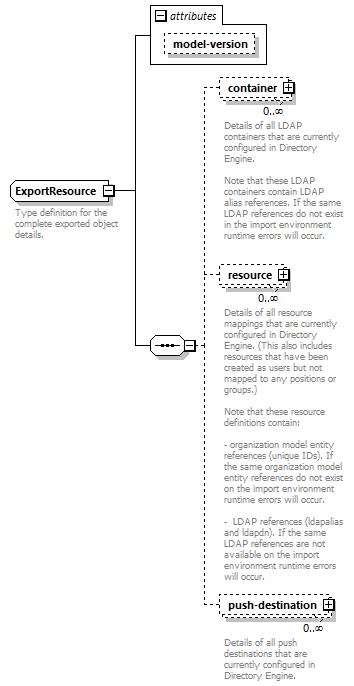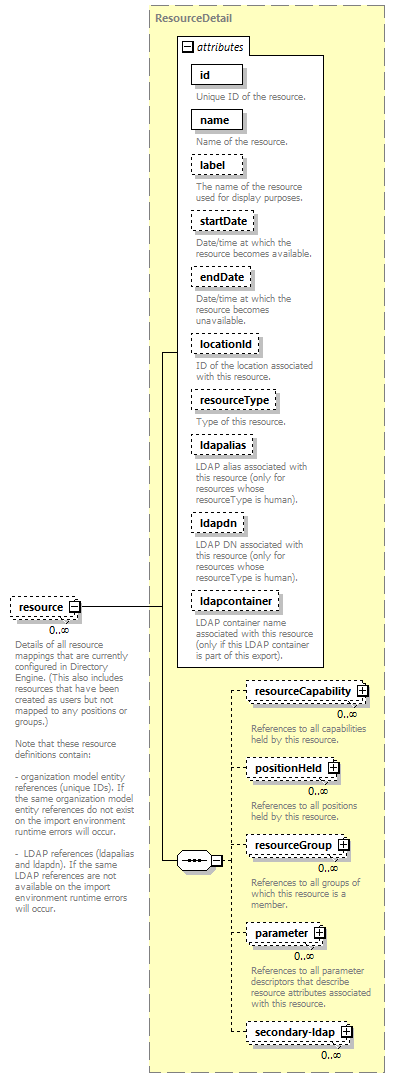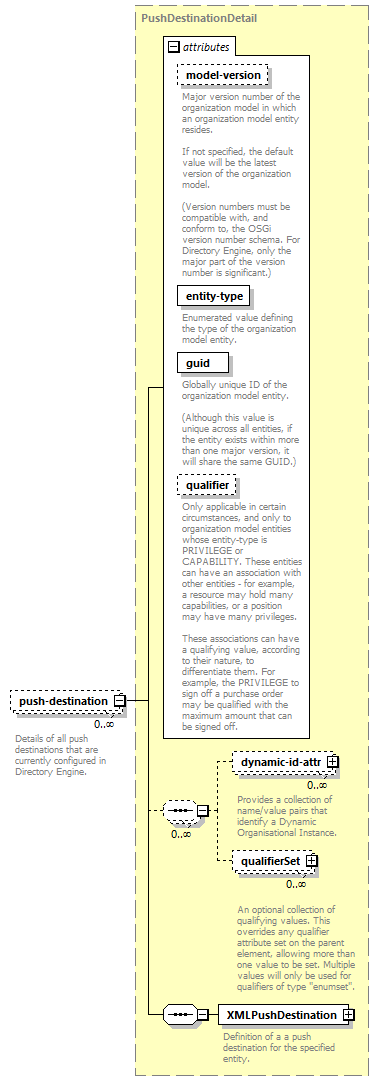| diagram |  |
||||||||||||
| namespace | http://exporter.api.de.n2.tibco.com | ||||||||||||
| children | container resource push-destination | ||||||||||||
| attributes |
|
||||||||||||
| annotation |
|
||||||||||||
| source | <xs:complexType name="ExportResource"> <xs:annotation> <xs:documentation>Type definition for the complete exported object details.</xs:documentation> </xs:annotation> <xs:sequence> <xs:element name="container" type="ldap:XmlLdapContainerExport" minOccurs="0" maxOccurs="unbounded"> <xs:annotation> <xs:documentation>Details of all LDAP containers that are currently configured in Directory Engine. Note that these LDAP containers contain LDAP alias references. If the same LDAP references do not exist in the import environment runtime errors will occur. </xs:documentation> </xs:annotation> </xs:element> <xs:element name="resource" type="ResourceDetail" minOccurs="0" maxOccurs="unbounded"> <xs:annotation> <xs:documentation>Details of all resource mappings that are currently configured in Directory Engine. (This also includes resources that have been created as users but not mapped to any positions or groups.) Note that these resource definitions contain: - organization model entity references (unique IDs). If the same organization model entity references do not exist on the import environment runtime errors will occur. - LDAP references (ldapalias and ldapdn). If the same LDAP references are not available on the import environment runtime errors will occur.</xs:documentation> </xs:annotation> </xs:element> <xs:element name="push-destination" type="PushDestinationDetail" minOccurs="0" maxOccurs="unbounded"> <xs:annotation> <xs:documentation>Details of all push destinations that are currently configured in Directory Engine.</xs:documentation> </xs:annotation> </xs:element> </xs:sequence> <xs:attribute name="model-version" type="xs:int" use="optional" default="-1"/> </xs:complexType> |
attribute ExportResource/@model-version
| type | xs:int | ||||
| properties |
|
||||
| source | <xs:attribute name="model-version" type="xs:int" use="optional" default="-1"/> |
element ExportResource/container
| diagram |  |
||||||||||||||||||||||||||||||||||||||||||||||||||||||
| type | XmlLdapContainerExport | ||||||||||||||||||||||||||||||||||||||||||||||||||||||
| properties |
|
||||||||||||||||||||||||||||||||||||||||||||||||||||||
| children | primary-ldap primary-group-ldap secondary-ldap secondary-group-ldap attribute-mapping administered-organisation candidate-query | ||||||||||||||||||||||||||||||||||||||||||||||||||||||
| attributes |
|
||||||||||||||||||||||||||||||||||||||||||||||||||||||
| annotation |
|
||||||||||||||||||||||||||||||||||||||||||||||||||||||
| source | <xs:element name="container" type="ldap:XmlLdapContainerExport" minOccurs="0" maxOccurs="unbounded"> <xs:annotation> <xs:documentation>Details of all LDAP containers that are currently configured in Directory Engine. Note that these LDAP containers contain LDAP alias references. If the same LDAP references do not exist in the import environment runtime errors will occur. </xs:documentation> </xs:annotation> </xs:element> |
element ExportResource/resource
| diagram |  |
||||||||||||||||||||||||||||||||||||||||||||||||||||||||||||||||||||||||||||||||||||||
| type | ResourceDetail | ||||||||||||||||||||||||||||||||||||||||||||||||||||||||||||||||||||||||||||||||||||||
| properties |
|
||||||||||||||||||||||||||||||||||||||||||||||||||||||||||||||||||||||||||||||||||||||
| children | resourceCapability positionHeld resourceGroup parameter secondary-ldap | ||||||||||||||||||||||||||||||||||||||||||||||||||||||||||||||||||||||||||||||||||||||
| attributes |
|
||||||||||||||||||||||||||||||||||||||||||||||||||||||||||||||||||||||||||||||||||||||
| annotation |
|
||||||||||||||||||||||||||||||||||||||||||||||||||||||||||||||||||||||||||||||||||||||
| source | <xs:element name="resource" type="ResourceDetail" minOccurs="0" maxOccurs="unbounded"> <xs:annotation> <xs:documentation>Details of all resource mappings that are currently configured in Directory Engine. (This also includes resources that have been created as users but not mapped to any positions or groups.) Note that these resource definitions contain: - organization model entity references (unique IDs). If the same organization model entity references do not exist on the import environment runtime errors will occur. - LDAP references (ldapalias and ldapdn). If the same LDAP references are not available on the import environment runtime errors will occur.</xs:documentation> </xs:annotation> </xs:element> |
element ExportResource/push-destination
| diagram |  |
||||||||||||||||||||||||||||||||||||||
| type | PushDestinationDetail | ||||||||||||||||||||||||||||||||||||||
| properties |
|
||||||||||||||||||||||||||||||||||||||
| children | dynamic-id-attr qualifierSet XMLPushDestination | ||||||||||||||||||||||||||||||||||||||
| attributes |
|
||||||||||||||||||||||||||||||||||||||
| annotation |
|
||||||||||||||||||||||||||||||||||||||
| source | <xs:element name="push-destination" type="PushDestinationDetail" minOccurs="0" maxOccurs="unbounded"> <xs:annotation> <xs:documentation>Details of all push destinations that are currently configured in Directory Engine.</xs:documentation> </xs:annotation> </xs:element> |
WSDL documentation generated by XMLSpy WSDL Editor http://www.altova.com/xmlspy